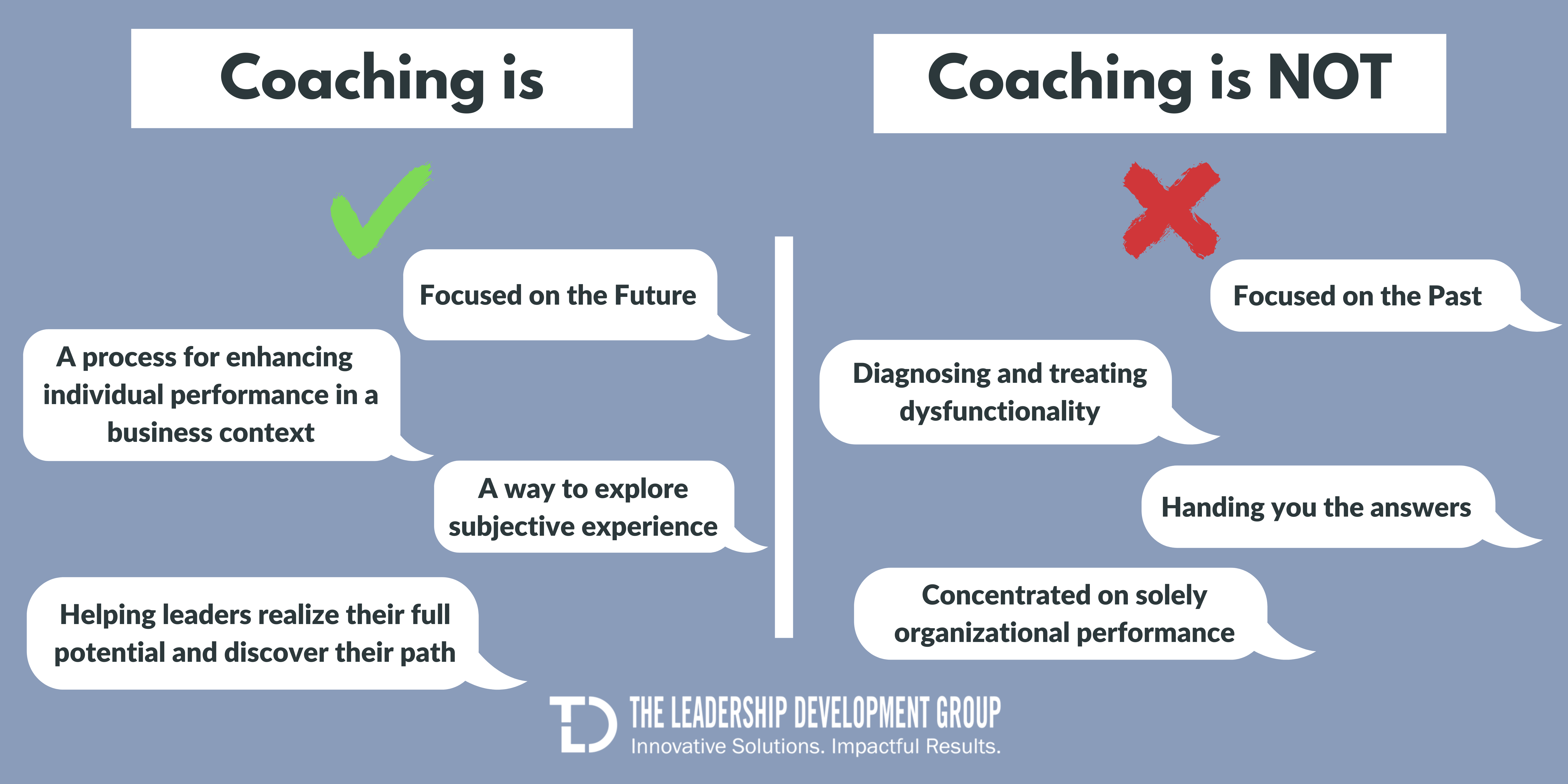Executive Coaching is designed as a thought-provoking and creative process that inspires leaders to maximize their personal and professional potential. At TLD Group we take our commitment to this philosophy seriously. As a health ecosystem talent development firm, we have designed our coaching solutions specifically with health industry leaders in mind.
Fundamentally, our goal is to embrace the leader as whole, competent, and resourceful with the primary goal of making the leader more self-reliant and able to contribute their full and best self to their work. Given today’s complex health industry environment, partnering with or hiring an executive coach helps to unlock potential and creates pathways to greater personal and professional fulfillment.

A coach is NOT the same as a mentor, consultant, therapist, or career counselor. A mentor/consultant will set out to train or give you direct advice in support of the professional goal or project you are attempting to accomplish. A therapist focuses on supporting client mental health with a focus on the past and present. A career counselor’s role is to help their client hone professional development skills such as creating a resume or cover letter and give direction on a career path.
A coach, on the other hand, works with their clients to reach their personal and professional goals. With a focus on the future, they guide and help their clients to focus on strengths, rather than directly advising. They motivate and hold their clients accountable to their goals. Finding the right leadership coaching partner, however, is both art and science.
The TLD Group Coaching Framework
Coach Interview and Selection
The coach and coachee relationship is an integral part of the coaching experience. When selecting a coach, it’s important to examine relevant expertise, coaching specialties, certifications and credentials. At TLD Group our team of world class trained management psychologists meet with each coaching client and make ‘best match’ coach recommendations based on the client’s coaching goals, leadership style, areas of expertise, and other critical factors.
Our global cadre of 400+ coaches have expansive executive coaching skills and experience across multiple industries with a depth of expertise in the sectors of healthcare. We provide choice, allowing the executive to choose whom he/she wants to work with as we know willingness and good chemistry are the far most important ingredients of a successful coaching relationship.
Introduction and Assessment
In the early stages of the coaching engagement, our coaches will conduct targeted assessment interviews with the executive and key stakeholders to determine strengths and developmental opportunities. In some instances, we also administer psychometric assessment(s) to assess intrinsic motivators, values, traits, and personality factors that contribute to self-awareness. Our coaches are trained in a variety of proven assessment and 360-degree feedback tools such as – Hogan, DISC, x360, and more.
Feedback and Action Planning
The results of the interviews and psychometric assessments form the basis of the formal assessment feedback delivered to the executive. To help ensure success for all parties, we provide our coaching in the context of the organization – in a three-part relationship between the organization, the executive, and the coach. The coach, coachee, and key stakeholders will then co-create the coachee’s development action plan specifying the coaching objectives and indicators of success.
Coaching
Our coaches maintain the highest executive coaching certifications in the industry and utilize proven coaching methods throughout the course of the engagement. The executive and their coach meet regularly over the course of the assignment where learnings are translated into practical application.
Anyone being coached should not expect to be given specific solutions or instructions on how to achieve their goals. Coaching is about uncovering important information about yourself and your situation that will help to illuminate the right decisions to make and actions to take. It is important to remember, the lack of structure in coaching is supposed to feel uncomfortable and challenging.
To help ground the process in progress against goals, our coaches will periodically facilitate triad meetings with the coachee, their manager and human resources partner; discussing progress in the context of how the coachee is being experienced in their day-to-day role.
Measurement and Sensemaking
Among coachees and HR leaders alike the topic of ROI for coaching remains paramount. We proactively obtain feedback to assess progress against the original coaching goals throughout the engagement. For organizations where we have partnered on multiple coaching engagements, our CRMs prepare coach forums. The intention of these forums is to discuss organizational coaching themes and feedback, as well as explore leadership development solutions that may produce broader impact for challenges that may be occurring at the department or organizational level.
Sustaining Progress and Continued Growth
While the formal coaching program has a defined beginning and endpoint, we believe in developing sustainability strategies to continue learning and contribute to future success. This helps to ensure the coachee and organization can continue to feel the impacts of their coaching investment for years to come.
Lasting change requires ongoing support, reassessment, and the agility to meet changing needs. Sustaining the positive impact of coaching requires a focus on long term actions by both the coachee and key organizational stakeholders to ensure continued development.
It is no secret that the health industry has high-demands. Driven by a strong desire to help the patient, it can be difficult to create the time and energy to invest in self-development. However, for those who do make the investment, coaching has shown to be a powerful tool for reaching personal and professional goals and achieving a deeper sense of fulfilment both personally and professionally.
Want to learn more about the power of coaching?




